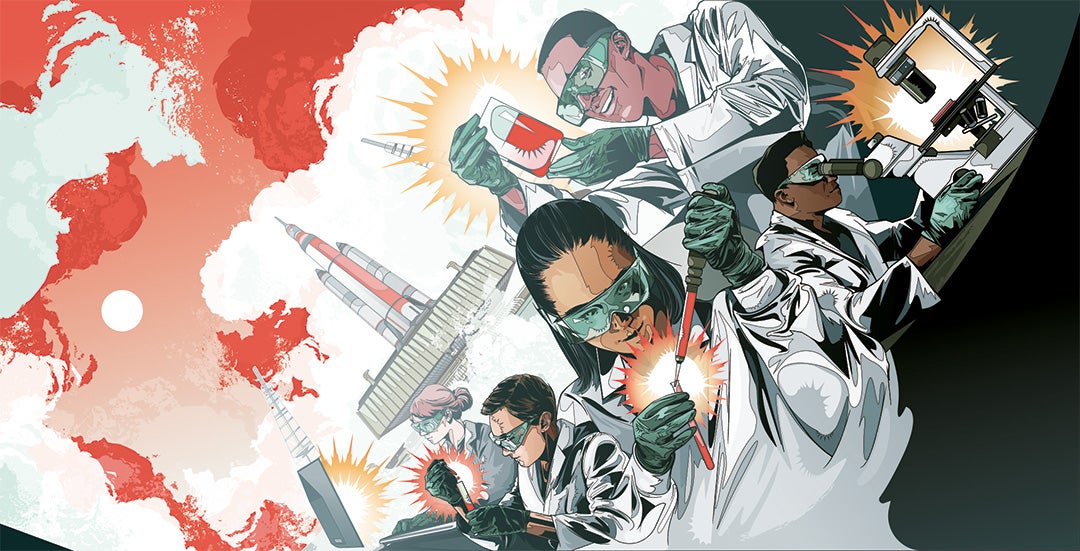Go for Launch
Rice professors and alumni advance research from the lab into the world.

Spring 2024
By Rachel Fairbank
Illustrations by Kako
For every exciting discovery in research, there’s also a long process of moving these findings into practical application, whether it’s creating a new device that can save on energy, a new test or treatment for a health condition, or a technology that can help reduce or eliminate carbon emissions. In recent years, Rice has developed new programs and resources to support researchers in translating their discoveries into startup companies.
“The talent pool here in Houston is huge,” says Rawand Rasheed ’23, who received his Ph.D. in mechanical engineering at Rice and is now the CEO and co-founder of the company Helix Earth Technologies. “We just don’t have the capital or the startup ecosystem here.” Through programs and classes, Rice is working to fill those gaps.
To support the next generation of entrepreneurs, Rice offers entrepreneurship classes and provides development opportunities like the Rice Innovation Fellows program and the 12-week OwlSpark Tech Startup and Small Business Accelerator. Rice also hosts events such as the Napier Rice Launch Challenge at the Liu Idea Lab for Innovation and Entrepreneurship (Lilie) as well as the Rice Alliance’s Energy Tech Venture Forum, Texas Life Science Forum and Rice Business Plan Competition, which is the largest and richest in the world. These programs promote a thriving network of new founders.
Here are just a few examples of technologies, teams and companies at various stages of development from across industries and departments.
Preparing to launch: a treatment for endometriosis
Roughly 10% of women suffer from endometriosis, a debilitating condition that, if left untreated, can lead to severe pain and infertility. There is no known cure for the affliction, and treatment options are limited, consisting of either hormonal therapy, such as birth control, or invasive surgery.
Rice bioengineering graduate students Samantha Fleury and Samira Aghlara-Fotovat are working to launch a startup dedicated to finding new, less invasive treatments for endometriosis. “Our goal is to create a therapy that can treat endometriosis by going after the inflammatory process,” says Fleury. “Inflammation is definitely a key player in disease development,” says Aghlara-Fotovat.
An integral part of their efforts has been Lilie’s Innovation Fellows program, which provides training, resources and mentorship to scientists who are looking to translate their discoveries into commercialization. “That is where our excitement for starting a company really took off,” Aghlara-Fotovat says.
Boosters away: Solidec
Solidec was founded in 2023 by Rice chemical and biomolecular engineers Ryan DuChanois and Yang Xia ’23 and materials scientist Haotian Wang. The company’s mission — to capture carbon dioxide from the air and convert it into chemicals and fuels — builds on discoveries made in Wang’s lab. “We all came together and recognized the potential of this technology to make a real-world impact,” says DuChanois, Solidec’s CEO. The foundation of their discovery is a new type of reactor called an electrolyzer platform, which can capture carbon using water, air and electricity. “Our technology can target a wide range of carbon sources,” ranging from pulling carbon dioxide out of the air to capturing carbon dioxide being emitted from a power plant, Wang says. “The whole process can be driven by energy, which can be run by renewable sources.”
In the process of developing this technology, Wang, DuChanois, Xia and their collaborators have been adapting their initial discoveries while also using the process of commercialization to direct their research focus. “There are huge synergies around the research being carried out in our lab and the long-term future of Solidec,” Wang says.

In orbit: Helix and Syzygy
When Rasheed started his doctoral studies at Rice, he was working as an engineer at NASA, where he was in the life support division working on next-generation systems for delivering clean air and water to astronauts for a future Mars mission. As a graduate student, he turned his attention to adapting these technologies for Earth-based applications, such as improving the efficiency of air-conditioning units and reducing the cost of carbon capture systems.
Selected as a Lilie Lab Innovation Fellow, Rasheed joined a group of Ph.D. students and postdocs every week to discuss various aspects of starting up a business — how to pitch their business idea, how to market it, and how to talk to potential customers and investors. “It was an MBA crash course for scientists,” Rasheed says. “The Innovation Fellowship was the only reason I started the company: It’s where I met my co-founder, and it’s what gave me the resources to go out and pursue this effort.”
This led to the founding of Helix Earth Technologies in 2022. The company now has eight employees, and its fundraising success includes grants from the National Science Foundation and the Department of Energy. The team hopes to offer their first product in 2025 — an energy efficiency device that can be installed in a standard air-conditioning unit and will reduce energy usage by up to 50%.
For Suman Khatiwada ’13, who earned his Ph.D. in materials science and nanoengineering at Rice, graduate school was where he met his future business collaborators Naomi Halas and Peter Nordlander, esteemed faculty in the electrical and computer engineering department. Based on research coming out of their lab, Khatiwada and his business partner, Trevor Best, co-founded Syzygy Plasmonics in 2018 with the goal of tackling decarbonization processes, including finding ways of removing carbon emissions from the chemical industry. “We’re designing an entirely new chemical reactor that uses light instead of combustion to power chemical reactions,” says Lee French, Syzygy’s vice president of marketing. Since its founding, Syzygy has grown into a company with over 100 employees, but it still has a close relationship with Rice. Says French, “We’re a tight community.”
Full circle
“As rice’s reputation for innovation grows, we’re excited to introduce new resources, initiatives and funding opportunities to support commercialization,” says Adrian Trömel ’18, assistant vice president for strategy and investments in the Office of Innovation. The office is building out work and lab space for nascent technologies as well as engaging industry leaders, investors and government partners at the Ion, Rice’s innovation hub located in Midtown. The Office of Innovation also recently launched the One Small Step program, which provides grants for Rice researchers almost ready to start up a business or license their discoveries, and it’s working on the One Giant Leap program, described so far only as “catalytic venture capital” for companies founded by Rice faculty, students and alumni. As Trömel says, “It comes full circle: We’re innovating in how we support innovators.”
